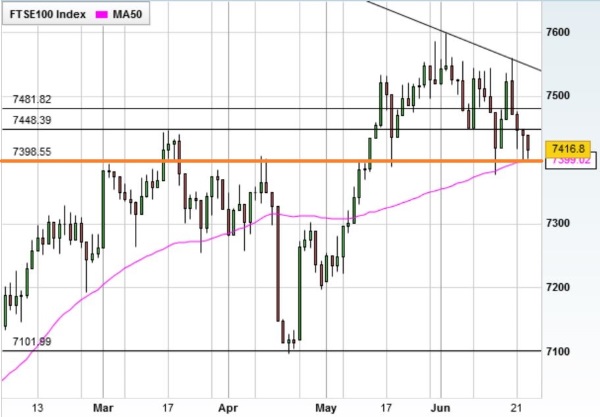Can FTSE 100 support hold firm?
23rd June 2017 11:22
by Lee Wild from interactive investor
Share on
This time last year we were all traipsing off to the polls, charged with deciding the UK's future relationship with Europe. We know how that ended. And it's been another difficult week for stockmarkets, although, in the scheme of things, a five-day loss of around 50 points to Friday lunchtime is hardly cause to panic.
Ending last week at 7,463, the FTSE 100 dipped below 7,400 briefly this week for only the second time since mid-May. It remains under pressure and there is clearly food for the bears, but the index is currently finding support around the big figure.
Losses would have been more modest had it not been for spectacular 20% dive. The subprime lender warned of much lower profits due to "higher-than-expected operational disruption from the migration of the home credit business to a new operating model".
However, two separate issues have dominated the past few days – oil prices and interest rates.
In Tuesday's Mansion House speech, Bank of England Governor Mark Carney said "now is not yet the time" to begin tightening monetary policy, given "mixed signals on consumer spending and business investment, and…still subdued domestic inflationary pressures, in particular anaemic wage growth".
Carney talks a lot of sense. While a desire to get rates back to normal – whatever 'normal' is these days - is quite understandable, the UK has enough on its plate, and how the economy copes with Brexit talks will be crucial.

Theresa May's Conservative Party is still haggling with Democratic Unionists, which is a worry. Taking this long to reach a deal at home does not bode well for far tougher talks ahead with European negotiators.
Carney's comments dampened expectations that UK interest rates would rise soon for the first time since 2007 – a surprise three votes in favour at the last policy meeting had made an increase more likely. That it isn't sent sterling tumbling.
That might typically have been a boon for blue chip exporters. Not this time. And low interest rates are squeezing already wafer-thin margins at domestic banks.
It explains why and have struggled, although the latter and its former executives have been hit by fraud charges linked to dodgy loans to Qatar during the financial crisis.
Shares in both are down, but analysts at UBS spy an opportunity. "Despite the cautious backdrop we see selective opportunities within the UK banks," the broker said, "with the prices of Barclays and Lloyds discount too much risk and too little execution in our view."
and are among the weekly losers, t-boned by the slump in crude prices to levels not seen since 2016. Oil is down 20% in the past four months.
While the majors have given up ground, as usual it's the small-cap explorers that have born the brunt of the selling, among them , and .
Wednesday's Queen's Speech had plenty to say about our withdrawal from the EU, but utilities let out a cheer when the weakened Tories were forced to leave out a planned energy price cap from their legislative plans.
That, and a well-received capital markets day in London midweek, have shares in British Gas-owner up 4% since Monday.
Elsewhere Friday, a stronger pound weighed on blue chips early doors, but high street bellwether is back in favour, and bargain hunters see value in after the accident-prone telecoms giant hit a new four-year low first thing.
However, broadcaster and perennial bid favourite is top of the pile. Liberum Securities said recently "ITV is in a structurally attractive position and we continue to like the story". The market is clearly catching up. Worth 320p, says the broker.
This article is for information and discussion purposes only and does not form a recommendation to invest or otherwise. The value of an investment may fall. The investments referred to in this article may not be suitable for all investors, and if in doubt, an investor should seek advice from a qualified investment adviser.